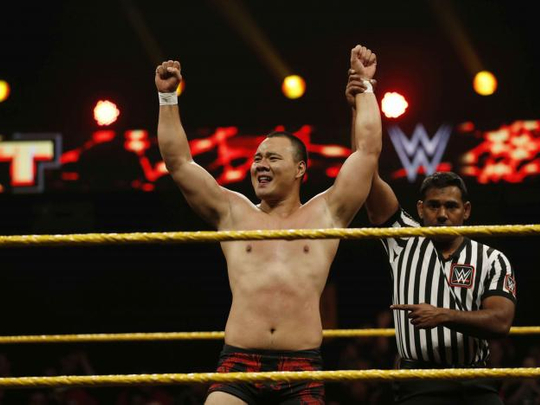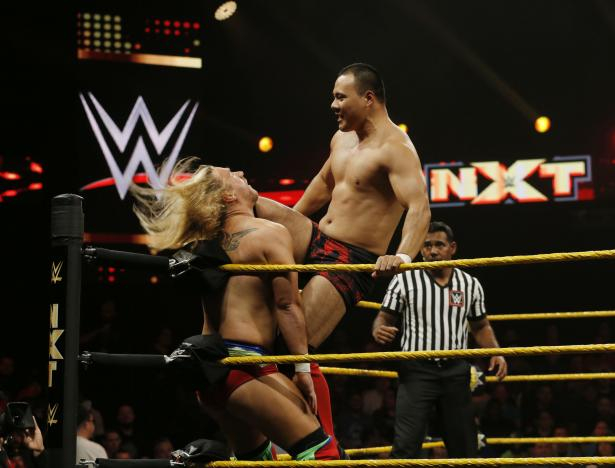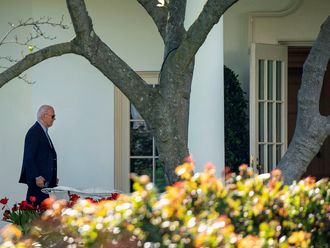
ORLANDO, Flordia: Three mornings a week, 22-year-old Bin Wang, a native of China's Anhui province, enters a beige, low-rise building tucked into an office park in Orlando, Florida, to spend hours body-slamming people.
In a few weeks, the 230-pound (104-kg) Wang, who arrived in the United States in June, will be joined by seven other Chinese athletes hand-picked by World Wrestling Entertainment Inc, in the hope that one of them will become the first Chinese WWE "superstar."
WWE, the $1.5 billion company known for big personalities and outrageous story lines, wants its Chinese wrestlers to be the next television sensation in China, a market where other US media companies have faltered.
In June, WWE announced it had signed Wang — whose fighting name is "Tian Bing" — and entered into an exclusive deal with Chinese online video provider PPTV to live stream its popular "Raw" and "SmackDown" shows in the country, dubbed into Mandarin. [See Wang in action.]
WWE hopes to succeed where others have failed, by bringing its own WWE Network online streaming service - currently available in 180 countries — to China, according to George Barrios, WWE's chief financial and strategy officer.
WWE is looking for a partner, which could be PPTV, so it can offer WWE Network in China and ultimately live stream events in China featuring its Chinese talent.
Stamford, Connecticut-based WWE is betting that China, with a population of over 1.4 billion and an expanding, digital-savvy middle class, will fuel the growth if its two-year-old streaming service, which has so-far amassed about 1.5 million US subscribers at a price of $9.99 per month.
Since 2000, twice as many Chinese citizens as Americans have joined the middle class, defined as households making the annual equivalent of $50,000 to $500,000, according to Credit Suisse. The online streaming video market in China is expected to be worth $7.85 billion by 2021, up from $2.67 billion this year, according to Digital TV Research.
Attracting Chinese fans could also help WWE woo Chinese investors. Chinese conglomerate Dalian Wanda and other Chinese firms looked at mixed martial arts franchise Ultimate Fighting Championship before talent agency WME-IMG bought it for $4 billion earlier this year, industry bankers told Reuters. Wanda declined to comment.
Risks
There are regulatory and political risks. Chinese regulators can shut WWE's operations down at any time if they deem them inconsistent with the country's values.
Earlier this year, Chinese regulators unexpectedly forced Alibaba Group Holding to end its online streaming partnership with Walt Disney Co just months after it was launched, to comply with recent regulations limiting foreign content online.
For the same reason, regulators shut down Apple Inc's online book and movie sales in China.
WWE may also come to rue its close ties with US President-elect Donald Trump, a member of the WWE Hall of Fame who used to appear regularly at matches.
Trump used China as a regular punching bag during his campaign and caused ire in Beijing last week by taking a congratulatory call from Taiwan's president, breaching decades of diplomatic practice.
Trump picked WWE co-founder Linda McMahon as head of the U.S. Small Business Administration on Wednesday, deepening his connection with the company. Nevertheless, WWE is not concerned its ties with the Trump administration might affect its effort in China, according to a source familiar with the situation, who wished to remain anonymous.
WWE's partnership with PPTV, which is owned by Chinese conglomerate Suning Holdings Group, may protect against any backlash because its parent has close ties to the Chinese government, industry experts said.
The Chinese government does not pre-approve scripts. WWE does post videos of Wang in training on Chinese social media sites, so fans can track his progress, said Paul "Triple H" Levesque, whose is WWE's head of talent and live events.
Physcal theatre
In June, Levesque went to Shanghai to audition Chinese athletes to come to Orlando for training.
"The biggest thing we look for is charisma," Levesque said, on a recent visit to Orlando.
WWE is also keen to find talent with a story that will resonate in China.
For example, one woman athlete from a rural village in northern China had not told her parents she was auditioning. When asked what she would do if she was accepted, she said she would have to disobey them and follow her dream.
Telling that story to young girls across China, where women are beginning to chart their own paths, is hugely powerful, Levesque said. That woman will arrive in Orlando in January.
WWE believes the underlying story line of good versus evil will translate to China, and it is a matter of helping viewers there understand WWE's unique mixture of sport and entertainment, Levesque said: "It's physical theater."
At WWE's performance center in Orlando, there are two remote-controlled cameras beaming practice sessions to head office in Stamford. One live streams into WWE Chief Executive Vince McMahon's office and the other into Levesque's office, an indication of how important new talent is to WWE.
"I leave it on in my office all the time," Levesque said.
Wang, who stands 6 feet 3 inches (1.9m), is one of the fighters hoping he will stand out and capture the bosses' attention, and ultimately, that of his country.
"My dream is for Chinese fans to know I am here," he said.













